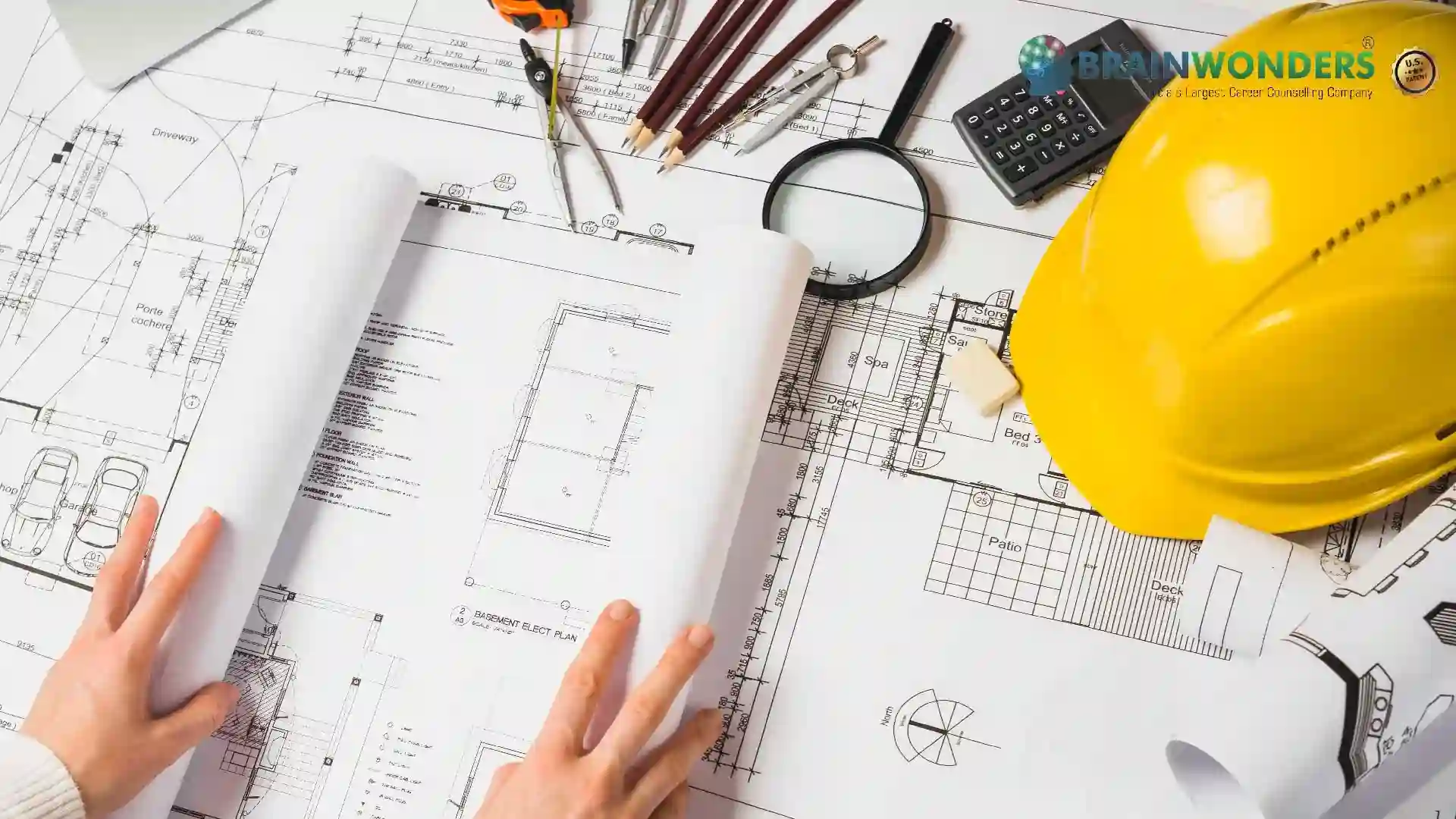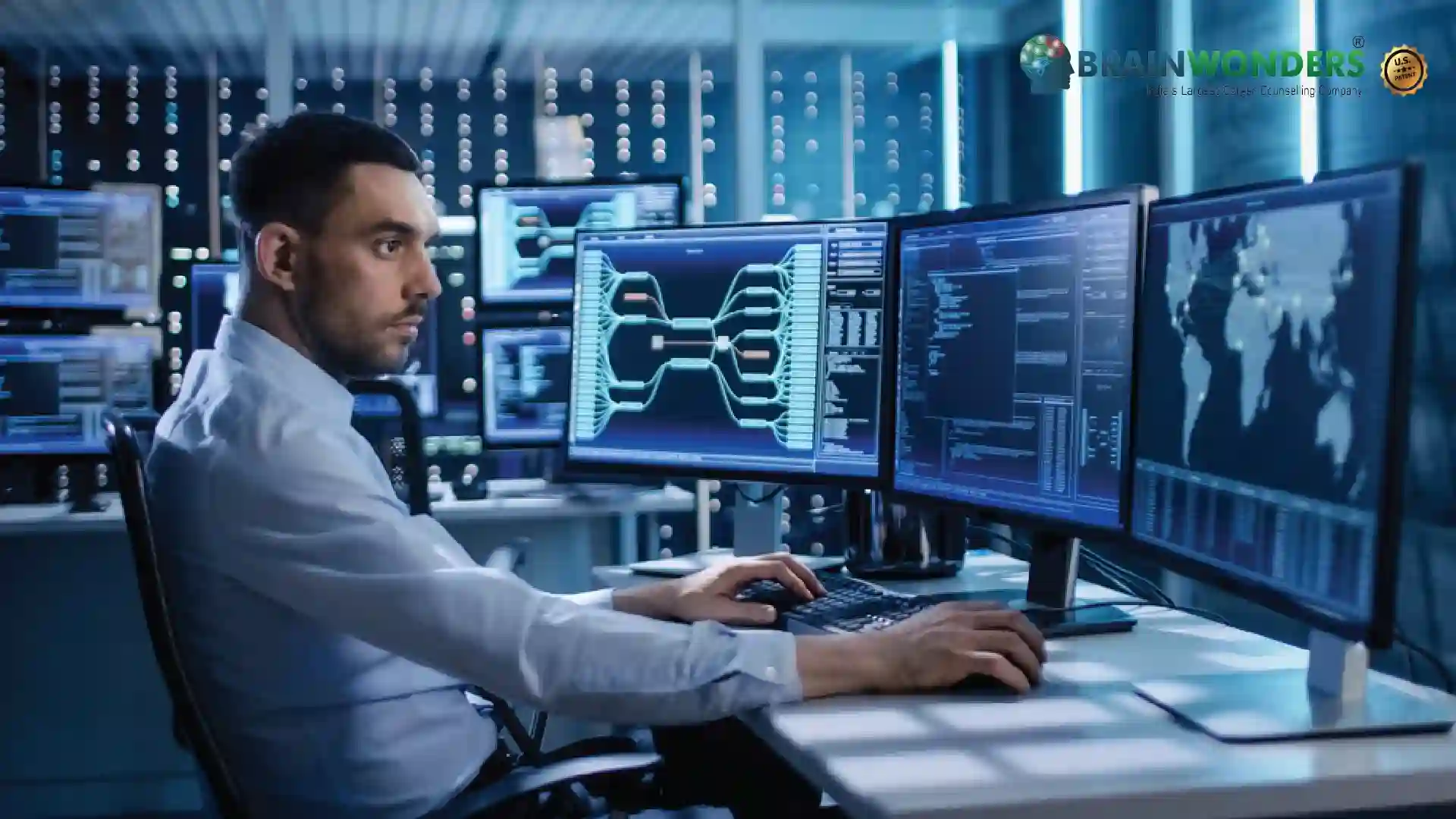How to become a Blockchain Developer
Overview, Courses, Exam, Colleges, Pathways, Salary
Overview
Who is Blockchain Developer ?
A Blockchain Developer is a skilled professional responsible for creating and implementing blockchain solutions. They design and develop decentralized applications (DApps), write smart contracts using programming languages like Solidity, and work with various blockchain platforms such as Ethereum or Hyperledger. Their expertise lies in ensuring blockchain security, optimizing performance, and integrating blockchain technology into existing systems. Blockchain Developers play a crucial role in revolutionizing industries like finance, supply chain, and healthcare by harnessing the transparent and immutable nature of blockchain to build innovative and trustless solutions. With the rising demand for blockchain applications, these developers are at the forefront of driving technological advancements and shaping the future of decentralized and secure digital systems.
Here are the steps to guide you on your journey:
- Understand Blockchain Fundamentals: Start by gaining a solid understanding of the underlying principles of blockchain technology. Study how blockchain works, its different types (public, private, consortium), consensus mechanisms, smart contracts, and decentralized applications (DApps). Numerous online tutorials, courses, and resources help you grasp these concepts.
- Learn Programming Languages: Proficiency in programming languages is essential for blockchain development. Focus on languages like Solidity (used for Ethereum smart contracts), JavaScript (for DApps), Python, or Go, as they are commonly used in blockchain development. Understand how to write, test, and deploy smart contracts and DApps.
- Familiarize Yourself with Blockchain Platforms: Study popular blockchain platforms like Ethereum, Hyperledger, and EOS. Learn their architecture, development tools, and how to interact with their networks. Each platform has unique features and uses cases, so explore them to identify the best fit for your projects.
- Practice with Development Tools: Use blockchain development tools like Truffle, Remix, Ganache, and Metamask for Ethereum development. These tools streamline the development process and facilitate the testing and deployment of smart contracts and DApps.
- Build Your Projects: Hands-on experience is crucial. Start with small projects and gradually move on to more complex ones. Create and deploy smart contracts, develop simple DApps, and experiment with blockchain features. This practical experience will enhance your skills and understanding.
- Collaborate and Contribute: Join blockchain communities and forums to collaborate with other developers. Contribute to open-source blockchain projects, review code, and participate in discussions. Working with others will expose you to new ideas and improve your skills.
- Stay Updated with Industry Trends: Blockchain technology is rapidly evolving, so stay updated with the latest trends, updates, and advancements. Follow blockchain news and blogs, and attend conferences or webinars to broaden your knowledge.
- Explore Specializations: Blockchain development offers various specializations like smart contract development, DApp development, blockchain security, or blockchain integration with other technologies. Explore these areas to find your interests and expertise.
- Consider Formal Education: While not mandatory, pursuing relevant courses or certifications in blockchain development from reputable institutions can add credibility to your profile and help you acquire in-depth knowledge.
- Build a Portfolio: Create a portfolio showcasing your blockchain projects and contributions. This portfolio will prove your skills and experience when seeking job opportunities or freelance work.
Different Types of Blockchain Developers
- Smart Contract Developers: These developers focus on writing and deploying smart contracts, self-executing contracts with predefined conditions and actions. They commonly use programming languages like Solidity (for Ethereum) to create these contracts that run on blockchain platforms.
- DApp Developers (Decentralized Application Developers): DApps run on decentralized networks, utilizing smart contracts for their functionality. DApp developers build user interfaces and backend logic for these decentralized applications.
- Blockchain Protocol Developers: These developers work on blockchain networks' core protocols and consensus mechanisms. They are involved in designing and developing blockchain platforms, ensuring security, scalability, and efficiency.
- Blockchain Security Experts: Security is critical in the blockchain space. Blockchain security experts focus on identifying vulnerabilities and potential threats within blockchain networks, smart contracts, and DApps, and work on implementing measures to protect against attacks.
- Blockchain Integration Developers: Organizations often require blockchain integration with their existing systems. Integration developers specialize in connecting blockchain networks with various platforms, databases, and applications to ensure seamless data exchange.
- Blockchain UX/UI Designers: User experience (UX) and user interface (UI) designers in the blockchain space focus on creating user-friendly interfaces for DApps and blockchain-based platforms, making them more accessible.
- Blockchain Researchers: Blockchain researchers contribute to advancing blockchain technology by conducting in-depth studies, exploring new algorithms, and proposing innovative solutions to address existing challenges.
- Enterprise Blockchain Developers: Enterprise blockchain developers work on solutions specifically tailored to businesses. They focus on developing private or consortium blockchains to enhance transparency, efficiency, and trust in various industries.
- Consensus Algorithm Specialists: Consensus algorithms are crucial in achieving agreement among participants in a decentralized network. These specialists study, design, and optimize consensus algorithms for blockchain use cases.
- Blockchain Architects: Blockchain architects take a holistic approach to designing blockchain solutions, considering the overall system architecture, scalability, security, and integration with existing infrastructure.
Typical day at work
What does Blockchain Developer do?
- Smart Contract Development: Writing and deploying smart contracts using programming languages like Solidity to automate processes and enforce rules within a blockchain.
- Decentralized Application (DApp) Development: Building decentralized applications that run on blockchain platforms like Ethereum, enabling trustless and transparent interactions.
- Blockchain Integration: Integrating blockchain technology into existing systems and applications to leverage its advantages, such as enhanced security and transparency.
- Consensus Mechanism Implementation: Understanding and implementing different consensus mechanisms (e.g., Proof of Work, Proof of Stake) to ensure the validity and security of transactions on the blockchain.
- Blockchain Security: Ensuring the security of the blockchain network and applications, protecting against potential vulnerabilities and attacks.
- Performance Optimization: Improving the performance and scalability of blockchain networks to handle a large number of transactions efficiently.
- Research and Innovation: Keeping abreast of the latest developments in blockchain technology and exploring innovative use cases.
- Collaboration: Working with cross-functional teams, including product managers, designers, and other developers, to create comprehensive blockchain solutions.
- Testing and Debugging: Conducting thorough testing and debugging to ensure the reliability and correctness of the blockchain applications.
- Tokenization and Cryptocurrency Development: Creating and managing tokens and cryptocurrencies on blockchain networks.
Abilities and Aptitude needed
What are the skills, abilities & aptitude needed to become Blockchain Developer?
- Programming Languages: Proficiency in programming languages such as Solidity (for Ethereum), JavaScript, Python, or C++ for developing smart contracts and decentralized applications (DApps).
- Blockchain Fundamentals: In-depth understanding of blockchain concepts, data structures, and how different blockchain platforms function.
- Smart Contract Development: Ability to design and code secure and efficient smart contracts to automate processes on the blockchain.
- Blockchain Platforms: Familiarity with major blockchain platforms like Ethereum, Hyperledger, and others, along with their specific tools and features.
- Cryptographic Principles: Knowledge of cryptographic algorithms and mechanisms used in blockchain for security and privacy.
- Web3.js and APIs: Proficiency in using Web3.js and blockchain APIs to interact with smart contracts and blockchain networks.
- Decentralized Application Development: Experience in building decentralized applications that interact with blockchain networks.
- Security Mindset: Strong focus on security practices to identify and mitigate vulnerabilities in smart contracts and blockchain applications.
- Consensus Mechanisms: Understanding of various consensus algorithms (e.g., Proof of Work, Proof of Stake) and their implications on blockchain networks.
- Testing and Debugging: Skill in testing and debugging smart contracts to ensure their correctness and efficiency.
- Version Control: Proficiency in using version control systems like Git to collaborate with teams and manage codebase.
- Problem-Solving Skills: Analytical and creative thinking to tackle complex challenges in blockchain development.
- Continuous Learning: Stay updated with the latest advancements in blockchain technology, as the field is constantly evolving.
- Collaboration: Ability to work in cross-functional teams and effectively communicate with stakeholders.
- Blockchain Security: Understanding and implementing best practices for blockchain security and securing private keys.
- Understanding of Tokenization: Knowledge of token standards (e.g., ERC-20, ERC-721) and how to create and manage tokens on blockchain platforms.
Developing proficiency in these skills and attributes will position you for a successful career as a Blockchain Developer and enable you to contribute to the growth and innovation of blockchain technology in various industries.
Salary
Salary for Blockchain Developer?
The salary for a Blockchain Developer in India can vary based on factors such as experience, location, company size, and industry. On average, a Blockchain Developer with 1 to 3 years of experience can expect an annual salary ranging from Rs. 600,000 to Rs.1,200,000.
For those with more experience (4 to 7 years), the annual salary can be around Rs.1,200,000 to Rs.2,500,000 or more. Highly experienced Blockchain Developers with 8 or more years of experience can earn annual salaries ranging from Rs.2,500,000 to Rs.5,000,000 or higher in some cases.
Please note that these figures are approximate and can change over time. Salaries can vary significantly depending on the specific company, demand for blockchain expertise in the job market, and the individual's skills and accomplishments.
Pathways
How to become an Blockchain Developer?
Entrance Exam
Entrance Exam for Blockchain Developer ?
Courses
Which course I can pursue?
Best Colleges
Which are the best colleges to attend to become an Blockchain Developer?
Industries
Which Industries are open for Blockchain Developer?
- Finance and Banking: Blockchain is transforming traditional finance with applications in digital payments, remittances, smart contracts, and decentralized finance (DeFi).
- Supply Chain and Logistics: Blockchain is used to track and verify supply chain processes, ensuring transparency and authenticity of goods.
- Healthcare: Blockchain enhances medical record management, secure data sharing, and drug supply chain traceability.
- Real Estate: Blockchain simplifies property transactions, title transfers, and property ownership verification.
- Government: Governments are exploring blockchain for identity management, voting systems, and public service delivery.
- Gaming: Blockchain is used for decentralized gaming platforms, ownership of in-game assets, and provably fair gameplay.
- Energy and Utilities: Blockchain facilitates peer-to-peer energy trading, grid management, and renewable energy certificate tracking.
- Legal and Intellectual Property: Blockchain enables secure intellectual property registration and smart contract-based legal agreements.
- E-commerce: Blockchain enhances e-commerce with secure payments, supply chain transparency, and anti-counterfeiting measures.
- Internet of Things (IoT): Blockchain ensures secure and decentralized communication and data exchange among IoT devices.
- Entertainment and Media: Blockchain provides copyright protection and transparent royalty distribution for content creators.
- Insurance: Blockchain streamlines insurance claims processing and policy management.
internship
Are there internships available for Blockchain Developer?
Yes, there are internships available for aspiring Blockchain Developers. Many companies, startups, and research organizations offer internship programs specifically focused on blockchain technology. These internships provide valuable hands-on experience and an opportunity to work on real-world blockchain projects.
Blockchain Developer internships can vary in duration, from a few months to a year, and may be offered during the summer or throughout the year. During the internship, participants get the chance to work with experienced blockchain professionals, learn about blockchain platforms, smart contract development, decentralized applications, and other essential aspects of blockchain technology.
Career outlook
What does the future look like for Blockchain Developer?
Blockchain Developers is highly promising and continues to be in high demand. As blockchain technology gains traction across industries, the need for skilled developers to design, build, and implement decentralized solutions is growing rapidly. Blockchain Developers are sought after by companies and startups working on various blockchain projects, including finance, supply chain, healthcare, and more. As the technology evolves and becomes more mainstream, the demand for qualified Blockchain Developers is expected to soar. This presents excellent career opportunities for individuals passionate about blockchain, as they can contribute to transformative projects and shape the future of decentralized applications and digital ecosystems. Continuous learning and staying up-to-date with the latest developments in blockchain technology are crucial to excel in this fast-evolving and exciting field.
Frequently Asked Questions:
1: How long does it take to become a Blockchain developer?
Answer: The time it takes to become a Blockchain developer can vary depending on the individual's prior programming knowledge and the depth of expertise they aim to achieve. For someone with a solid programming background, it may take several months of dedicated learning and practice to grasp the core concepts and start developing basic blockchain applications. However, becoming proficient and experienced in the field may take a year or more of continuous learning and hands-on experience.
2: Does Blockchain require coding?
Answer: Yes, Blockchain development typically requires coding skills. Knowledge of programming languages like Solidity (for Ethereum), JavaScript, Python, Go, or other languages used in smart contract development and decentralized application (DApp) development is essential for a Blockchain developer.
3: What is the salary of a Blockchain developer?
Answer: The salary of a Blockchain developer can vary significantly based on factors such as experience, location, job role, and the organization they work for. On average, a Blockchain developer's salary can range from $80,000 to $150,000 per year, with experienced developers and those working in high-demand industries commanding higher salaries.
4: Is Blockchain coding hard?
Answer: The difficulty level of Blockchain coding can vary depending on the individual's prior coding experience and the complexity of the projects they work on. Learning the fundamentals of Blockchain and writing basic smart contracts can be manageable for developers with programming knowledge. However, mastering advanced concepts and dealing with complex use cases may present challenges that require continuous learning and problem-solving skills.
5: Which language is used for Blockchain?
Answer: Several programming languages are used for Blockchain development. Solidity is the most popular language for writing smart contracts on the Ethereum platform. JavaScript, Python, and Go are commonly used for DApp development and blockchain-related projects. The choice of language depends on the specific blockchain platform and the developer's preferences and requirements.
6: Is Being a Blockchain Developer a Good Job?
Answer: Being a Blockchain developer can be a rewarding career choice, considering the increasing demand for blockchain technology across various industries. As technology evolves, Blockchain developers can work on cutting-edge projects, contribute to innovative solutions, and be part of transformative changes in sectors like finance, supply chain, healthcare, and more.
7: How Much Do Blockchain Developers Make?
Answer: The salary of Blockchain developers varies based on factors such as experience, location, expertise, and the specific job role. Blockchain developers earn average competitive salaries ranging from $80,000 to $150,000 yearly.
8: Can a Blockchain Developer Work from Home?
Answer: Yes, many Blockchain developers have the flexibility to work remotely or from home, especially in roles that involve project-based work or working for globally distributed teams. Remote work is becoming more common in the tech industry, and Blockchain developers often enjoy the freedom to work from anywhere with a stable internet connection. However, the ability to work from home may depend on the employer's policies and the nature of the projects.



